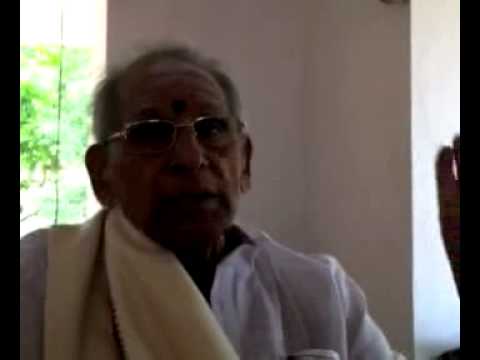Svanubhava kick started it’s first day with a stellar concert by the great maestro, Sri. Nedunuri Krishnamurthy. Known for his amazing tonal quality and musical continuity, the vidwan had the packed auditorium of students, teachers, and esteemed musicians spellbound.
When asked about where he draws inspiration, Krishnamurthy thanks his mother for being a strong influence in his life. “She was a very good singer”, he explained, “She would always be singing tarangams and bhajans, and I was very influenced by that”.
A disciple of the legendary Dr. Sripada Pinakapani, Nedunuri Krishnamurthy did not have exposure to listening to many carnatic concerts growing up in the small village of Pithapuram, Andhra Pradesh. “I did not have the opportunity to listen to many music concerts while growing up. It was upto me to practice what I was taught and run with it”. In fact, it wasn’t until he came to Chennai, that he began to listen to more concerts.
Thanks to his mother’s influence and his well-to-do family, Nedunuri explains that it was easier to take up music as a career. He credited the state of Tamil Nadu for accepting him and his music and is convinced he must have been Tamil in his previous birth. He also mentioned that it was vidwans like the great violin maestro Lalgudi Sri G. Jayaraman and Sri Palghat Raghu, who opened the eyes of critics and listeners to Nedunuri Krishnamurthy, as they always made it a point to specifically request accompanying the vocalist at the Music Academy. When asked what he looks for in a concert, Krishnamurthy answers simply, “You must create anubhava (experience) for the audience. One that they won’t soon forget.”
[youtube_video id=s0jci7fuvuQ]
The full interview with Krishnamurthy
Anjika Manipuri Dance troupe
Following the concert, the Anjika Manipuri Dance troupe made it’s audience experience the power of religion and spirituality, through Manipuri Dance. This specific dance tradition, Karuna Devi (Manipuri dancer) explains, was developed through religious festivals and daily routines followed by the people of Manipur. Legend has it that the indeginous people of the valley of Maniopur were in fact, the true Gandharvas (expert-dancers) as fabled in Epics such as Ramayana and Mahabharata. The interesting aspect of the dance culture in Manipur is that there are dances for various ceremonies from the beginning of life to death.
[youtube_video id=Bmay9h9FsIo]
A one on one with Karuna Devi
It is all an experience one lives in life. So, naturally the experiences are tranferred to dance tradition. Ras Leela, the highly insightful dance drama was the choice of the day. Viewed as the highest expression of artistic intelligence, devotion, and excellence of Manipuris, the dance drama evoked beauty, tradition, and sensitivity.
Dr. Chitra Madavan illuminating lecture
As a slight deversion from the performance aspect of Svanubhava, Dr. Chitra Madavan gave an illuminating lecture demonstration on Hindu Temples as Social, Economic, and Cultural Centres. Through detailed images of various ancient temples of India, Chitra transported the audience’s minds to a different era where temples where more than just a place of quiet prayer. There was a time, she says, when temples were the nucleus of villages and towns. Music and dance were mandatory for worship. They were equally great centres for learning and educational development. Her slide show allowed the audience to view the ancient carvings on the walls of old temples highlighted these aspects.
Land of Ashes
The last performance of the day and possibly the most powerful, was “Land of Ashes” by Indianostrum Theatre. With the use of nothing more than a black sheet and a few props, the four main actors (also the only actors) lit the stage to give a riveting portrayel of casualties of war. Basing the Sri Lankan war as the crux of the story, the play delved into gripping details of the holocaust, the concept of fear, and the perseverence of the human spirit.
[youtube_video id=3MIhk64efIU]
Actor Cordis Paldano spoke about his role in “Land of Ashes”
Director Koumarine Valavane spoke about his inspiration to write the play, a story he had heard of, about a Jewish actress who used puppettry as an outlet to facing the perils and impending doom of the concentration camp where she was trapped. For close to an hour, not a cell phone or sound was heard in the audience. Precisely what Koumarine had hoped for.
“Watching something on TV cannot have the same effect as watching live theatre. There is a connection that the performer makes with his/her audience. That is what makes it meaningful”, he says. Following the grand finale, a thundering applause followed the performance. On behalf of the audience, I think it’s safe to say that the self experience (Svanubhava) begins today.









